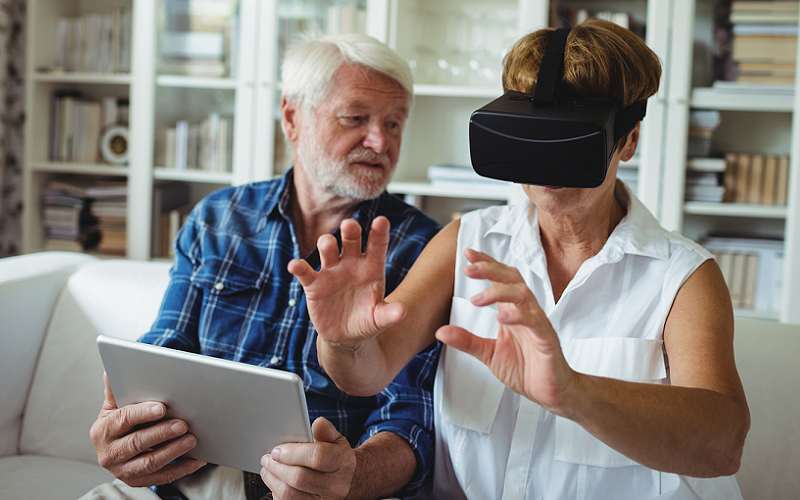
As we advance in age, the specter of cognitive decline looms as a significant concern, impacting not only individuals but also their families and communities. This decline, characterized by a reduction in memory, attention, and decision-making abilities, can profoundly affect one’s quality of life. However, in our continuous quest to mitigate these effects, a groundbreaking approach has emerged: Virtual Reality (VR) Therapy.
VR Therapy, once a concept confined to the realms of science fiction, is now at the forefront of innovative treatments for cognitive impairments. By immersing individuals in a fully interactive, computer-generated environment, VR offers a unique, engaging, and adaptable platform for cognitive rehabilitation.
Contents
Understanding Cognitive Decline
Before getting into the revolutionary impact of Virtual Reality (VR) Therapy in addressing cognitive decline, it’s crucial to comprehend what cognitive decline entails. This understanding lays the groundwork for appreciating the innovative solutions VR therapy offers.
Definition and Symptoms of Cognitive Decline
Cognitive decline refers to a noticeable and measurable reduction in cognitive abilities, including memory, attention, and decision-making skills. Unlike normal age-related changes, cognitive decline significantly interferes with daily activities and independence. Symptoms may vary but often include difficulties with memory recall, challenges in learning new tasks, issues with concentration and decision-making, and a noticeable decrease in problem-solving abilities. Understanding these symptoms is vital for early recognition and intervention.
Common Causes and Risk Factors of Cognitive Decline
Cognitive decline can stem from various causes, with age being the most common factor. However, other contributors play a significant role, such as genetic predispositions, lifestyle choices, and environmental factors. Neurological diseases like Alzheimer’s and other forms of dementia are prominent causes. Additionally, risk factors like cardiovascular diseases, diabetes, and lifestyle habits such as smoking, poor diet, and lack of physical exercise can exacerbate or accelerate the onset of cognitive decline [1].
Cognitive Decline’s Impact on Quality of Life
The impact of cognitive decline extends beyond the individual; it affects family, friends, and society. As cognitive abilities wane, independence diminishes, leading to increased reliance on caregivers and healthcare systems. This decline can also trigger emotional and psychological effects like depression and anxiety, both in individuals experiencing the decline and their caregivers. Understanding this impact is essential for developing compassionate and effective care strategies, including innovative approaches like VR therapy.

The Evolution of Virtual Reality Technology
To fully grasp how Virtual Reality (VR) has become a pioneering tool in combating cognitive decline, it’s essential to trace its journey from a futuristic concept to a practical healthcare tool. This evolution not only highlights VR’s technological advancements but also sets the stage for its application in cognitive health.
Historical Development of VR
The history of VR dates back to the mid-20th century, with early concepts and devices aiming to create immersive experiences. The 1960s saw the emergence of some of the first VR systems, which were rudimentary by today’s standards. These early systems, such as the Sensorama and the Head-Mounted Display (HMD), laid the groundwork for subsequent developments. Throughout the 1980s and 1990s, VR technology continued to evolve, albeit primarily within academic and military settings, due to the high costs and limited accessibility [2].
VR in Modern Times
The 21st century marked a significant turning point for VR, with advancements in computer technology and graphics rendering making it more accessible and affordable. The gaming industry played a pivotal role in bringing VR to the mainstream, leading to the development of sophisticated, user-friendly VR headsets and applications. These advancements opened new doors, allowing VR to transcend entertainment and venture into various fields, including education, training, and, importantly, healthcare.
VR in Healthcare and Therapy
In the realm of healthcare, VR’s potential was quickly recognized. Its ability to create controlled, immersive environments made it ideal for therapeutic applications, particularly in mental health, physical therapy, and cognitive rehabilitation. Early research and clinical trials demonstrated VR’s effectiveness in these areas, setting the stage for its use in tackling more complex challenges, such as cognitive decline. This transition from a novel technology to a therapeutic tool underscores VR’s versatility and its growing importance in modern healthcare [3].

Virtual Reality Therapy for Cognitive Decline
With a deeper understanding of both cognitive decline and the evolution of Virtual Reality (VR) technology, we can now explore how VR therapy is being utilized to address cognitive impairments. This innovative approach harnesses VR’s immersive and interactive capabilities to offer novel therapeutic experiences.
How VR Therapy Works
Virtual Reality Therapy for cognitive decline involves the use of VR technology to create simulated environments that are both engaging and controllable. These environments can be tailored to mimic real-life situations or create unique scenarios that target specific cognitive functions. The immersive nature of VR allows users to interact with these environments in a way that stimulates cognitive processes such as memory, attention, and problem-solving. Through repeated sessions, VR therapy aims to strengthen these cognitive abilities, potentially slowing down or even reversing aspects of cognitive decline.
Types of VR Interventions
VR interventions for cognitive decline vary widely, catering to different needs and capabilities. Some common types include memory enhancement games, virtual reality simulations that improve attention and focus, and scenarios designed to enhance problem-solving and decision-making skills. These interventions are often gamified, making the therapy process not only effective but also enjoyable and motivating for the users [4].
Benefits of VR in Cognitive Rehabilitation
One of the primary benefits of VR therapy in cognitive rehabilitation is its ability to provide personalized and adaptive experiences. The therapy can be tailored to the specific needs and progression of each individual, making it a highly effective tool. Additionally, the immersive nature of VR ensures a high level of engagement, which is crucial for the success of any therapeutic intervention. Furthermore, VR allows for the safe replication of real-life scenarios that might be difficult or impossible to recreate otherwise, providing valuable practical training and assessment opportunities in a controlled environment.
Virtual Reality Therapy Research and Case Studies
The potential of Virtual Reality (VR) therapy in slowing cognitive decline is not just theoretical; it is grounded in a growing body of research and real-world case studies. Examining these can provide valuable insights into the effectiveness and practical applications of VR in cognitive rehabilitation.
Key Studies Supporting VR Therapy
Numerous studies have investigated the impact of VR therapy on cognitive decline, with many reporting positive outcomes. For instance, a study published in the “Journal of NeuroEngineering and Rehabilitation” demonstrated that VR interventions could improve attention and memory in individuals with mild cognitive impairment.
Another notable study, featured in “Gerontechnology,” found that VR not only enhanced cognitive function in older adults but also improved their emotional well-being. These studies, among others, provide empirical evidence supporting the use of VR in cognitive rehabilitation, highlighting its potential as a powerful tool against cognitive decline [5].
Notable VR Therapy Success Stories
Beyond academic research, there are numerous success stories of individuals who have benefited from VR therapy. For example, a case study involving an older adult with early-stage Alzheimer’s showed significant improvement in memory and spatial orientation after undergoing a VR-based therapy program.
Another inspiring story comes from a rehabilitation center where VR interventions helped stroke patients regain cognitive functions that were thought to be permanently lost. These real-life examples underscore the transformative impact that VR therapy can have on individuals experiencing cognitive decline.
Current Limitations and Challenges of VR Therapy
While the benefits of VR therapy are promising, it’s important to acknowledge the current limitations and challenges in this field. One of the primary concerns is the accessibility of VR technology, which can be cost-prohibitive for some patients and healthcare facilities.
Additionally, there is a need for more extensive and long-term studies to fully understand the efficacy and optimal application of VR therapy in cognitive rehabilitation. Navigating these challenges is crucial for the continued development and widespread adoption of VR interventions in cognitive care.
References
[1] Cognitive-motor interventions based on virtual reality and instrumental activities of daily living (iADL)
[2] Therapeutic Application of Virtual Reality in the Rehabilitation of Mild Cognitive Impairment
[3] The effectiveness of virtual reality for people with mild cognitive impairment or dementia
[4] The Long-term Effects of Immersive Virtual Reality Reminiscence in People With Dementia
[5] Effects of incorporating virtual reality training intervention into health care on cognitive function and wellbeing

